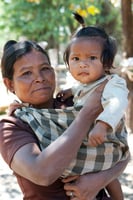More Research Needed About Refugee Children
Exposure to violence is a major risk factor in determining whether refugee children develop PTSD or other mental health problems. Researchers at Oxford, Harvard, and Yale universities, and the Oxford Health NHS Foundation Trust recently conducted a systematic review of the mental health risk factors and outcomes of displaced and refugee children and adolescents, focusing on the income levels of the countries in which they eventually settled.
“The mental health of children who have been forcibly displaced is of particular concern because of their experiences of insecurity at a formative state of child development,” the authors emphasize. They call for further research on specific groups of children, including ex-combatants, children who have been the victims of traffiking, children with uncertain immigration status, and refugees returning (voluntarily or involuntarily) to their home country. The early-life adversity that refugee children experience may affect them even at the level of their DNA.
For more information about the consequences of childhood maltreatment and exposure to violence, read Psychiatric News at http://pn.psychiatryonline.org/content/46/13/1.1.full . In addition see the book PTSD in Children and Adolsescents, which is available from American Psychiatric Publishing at http://www.appi.org/SearchCenter/Pages/SearchDetail.aspx?ItemId=62026.
(Image: Shutterstock)






